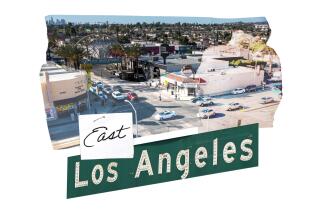Cities Join Forces to Tackle Common Problems While Cutting Costs : Government: Coalition seeks to give communities more clout and access to funding.
The borders marking city limits in Southeast Los Angeles County symbolize municipal pride, independence and a sense of friendly competition to residents. But some of those boundaries are beginning to blur as leaders of eight cities in the region increasingly cooperate to attack nagging social and economic problems.
The concept of regional collaboration--combining the resources of individual cities to address common concerns, cut costs and improve service to residents--has been proposed in the region for years, but little has come of it.
Now, inspired partly by the sluggish economy and years of budget cuts, the eight cities are seeking new joint methods to bring jobs, education, transportation and safety to the area’s estimated 370,000 residents. Their efforts follow a national trend, experts say, and may be more comprehensive than most.
More than 1,500 jobs have been lost in the last year as industry continues to trickle out of the region, analysts say. Most of the cities have adopted a utility users tax to stabilize budgets rocked by the loss of state funding during recent budget cuts.
Compounding the problems are population density, below-average education levels--up to 70% of the adults in the area do not have high school diplomas--and high unemployment, which hovers around 10%, according to a report compiled by the office of Assemblywoman Martha M. Escutia (D-Huntington Park).
Under Escutia’s leadership, the cities formed the Southeast Community Development Corp. last spring. The coalition unites Bell, Bell Gardens, Commerce, Cudahy, Huntington Park, Maywood, South Gate and Vernon under a nonprofit umbrella.
One of the corporation’s first proposals is to create a trolley system using alternative-fuel vehicles to feed into the Blue Line and Metrolink systems.
Under the $500,000 plan, individual cities would pool unused funds from the Air Quality Management District and apply to the AQMD for matching funds to pay for the project.
The AQMD collects money from motor vehicle registration fees and distributes a percentage to cities to be used for local transportation projects.
Because each city’s share is based on population, an individual municipality may not have enough money to fund its own project.
More to Read
Sign up for Essential California
The most important California stories and recommendations in your inbox every morning.
You may occasionally receive promotional content from the Los Angeles Times.









